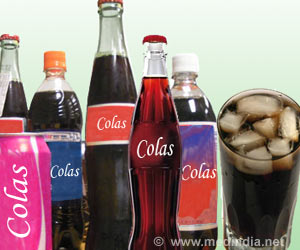Highlights
- Frequent consumption of sugar-sweetened beverages increases the risk of developing type 2 diabetes, high blood pressure, heart disease and stroke
- Consumption of sugar-sweetened beverages affect health
- Public education is needed to create awareness on the harmful effects of excess sugar-sweetened beverage consumption
The risk factors include abdominal obesity, triglycerides, elevated blood pressure, high fasting blood sugar levels and reduced HDL or good cholesterol levels.
Cardiometabolic conditions including metabolic syndrome and diabetes result in 19 million deaths every year, reported the World Health Organization.
Effects of Sugar-sweetened Beverage
He also said, "Our analysis revealed that most epidemiological studies strongly show that frequent intake of these beverages contributes to the onset of the metabolic syndrome, diabetes and hypertension."
Recently, some studies have reached conflicting findings on the relationship between beverage consumption and health conditions like diabetes and heart diseases. Therefore, the research team has critically assessed on overall trends.
Some previous studies had negative or neutral findings. However, most of the reviews supported the link between consumption of sugar-sweetened beverages and the risk of developing metabolic syndrome. Most of these studies examined individuals who drank more than five sugar-sweetened beverages per week.
The previous studies on diet and diabetes revealed that consuming two servings of sugar-sweetened beverages a week increases the risk of developing type 2 diabetes.
Several studies that were analyzed showed that drinking at least one sugar-sweetened beverage a day have elevated blood pressure levels.
Essop said that there is a clear need for public education about the harmful effects of excess consumption of sugar-sweetened beverages.
"But our understanding of this topic would benefit from additional research to further clarify how sugar-sweetened beverages affect our health. We do see some limitations in the current research on this topic, including a need for longer-term studies and standardized research methods."
What are Sugar-sweetened Beverages?
Sugar-sweetened beverages (SSB) are drinks that have added sugar like non-diet soft drinks or sodas, flavored juice drinks, sports drinks, coffee drinks, sweetened tea, energy drinks, and electrolyte replacement drinks.
The calories in sugar-sweetened beverages can lead to weight gain and provide little or no nutritional value. Those extra calories from the sugar-sweetened beverages can lead to other health risks including obesity, type 2 diabetes, heart disease, and tooth decay.
To stay healthy, individuals need to pay attention to what they are drinking. Some ’soft drinks’ claim to be packed with vitamins and antioxidants, but are often found to be loaded with sugar.
Plenty of healthy and tasty alternatives are available to sugar-sweetened beverages and slowly switching to these healthy foods can help every individual in the family make smart beverage choices and stay healthy.
Reference
-
Sugar-Sweetened Beverages
- (http://www.health.ri.gov/healthrisks/sugarsweetenedbeverages/)
Source-Eurekalert














